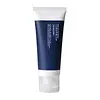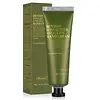What's inside
What's inside
 Key Ingredients
Key Ingredients

 Benefits
Benefits

 Concerns
Concerns

 Ingredients Side-by-side
Ingredients Side-by-side

Water
Skin ConditioningButyrospermum Parkii Butter
Skin ConditioningDipropylene Glycol
HumectantGlycerin
HumectantCetearyl Alcohol
EmollientPolyglyceryl-3 Methylglucose Distearate
EmulsifyingBeeswax
Emulsion StabilisingSorbitan Sesquioleate
EmulsifyingGlyceryl Stearate
EmollientPanthenol
Skin ConditioningSodium Hyaluronate
HumectantPrunus Amygdalus Dulcis Oil
Skin ConditioningOlea Europaea Fruit Oil
MaskingSimmondsia Chinensis Seed Oil
EmollientPersea Gratissima Oil
Skin ConditioningAllantoin
Skin ConditioningPhellodendron Amurense Bark Extract
Skin ConditioningCoptis Japonica Extract
AntimicrobialScutellaria Baicalensis Root Extract
AstringentScrophularia Buergeriana Extract
Skin ConditioningPiper Methysticum Root Extract
Skin ConditioningGardenia Florida Fruit Extract
Skin ConditioningAstragalus Membranaceus Root Extract
EmollientCnidium Officinale Root Extract
Skin ConditioningPanax Ginseng Root Extract
EmollientGinkgo Biloba Leaf Extract
Skin ConditioningCoix Lacryma-Jobi Ma-Yuen Seed Extract
Skin ConditioningCurcuma Longa Root Extract
MaskingMorus Bombycis Leaf Extract
SmoothingLycium Chinense Fruit Extract
AntioxidantSophora Flavescens Root Extract
AntioxidantGlycyrrhiza Uralensis Root Extract
Skin ConditioningSodium Polyacryloyldimethyl Taurate
Emulsion StabilisingGlyceryl Caprylate
EmollientCaprylyl Glycol
EmollientButylene Glycol
HumectantHydrogenated Polydecene
EmollientXanthan Gum
EmulsifyingTrideceth-10
CleansingDisodium EDTA
Tocopherol
Antioxidant1,2-Hexanediol
Skin ConditioningWater, Butyrospermum Parkii Butter, Dipropylene Glycol, Glycerin, Cetearyl Alcohol, Polyglyceryl-3 Methylglucose Distearate, Beeswax, Sorbitan Sesquioleate, Glyceryl Stearate, Panthenol, Sodium Hyaluronate, Prunus Amygdalus Dulcis Oil, Olea Europaea Fruit Oil, Simmondsia Chinensis Seed Oil, Persea Gratissima Oil, Allantoin, Phellodendron Amurense Bark Extract, Coptis Japonica Extract, Scutellaria Baicalensis Root Extract, Scrophularia Buergeriana Extract, Piper Methysticum Root Extract, Gardenia Florida Fruit Extract, Astragalus Membranaceus Root Extract, Cnidium Officinale Root Extract, Panax Ginseng Root Extract, Ginkgo Biloba Leaf Extract, Coix Lacryma-Jobi Ma-Yuen Seed Extract, Curcuma Longa Root Extract, Morus Bombycis Leaf Extract, Lycium Chinense Fruit Extract, Sophora Flavescens Root Extract, Glycyrrhiza Uralensis Root Extract, Sodium Polyacryloyldimethyl Taurate, Glyceryl Caprylate, Caprylyl Glycol, Butylene Glycol, Hydrogenated Polydecene, Xanthan Gum, Trideceth-10, Disodium EDTA, Tocopherol, 1,2-Hexanediol
Water
Skin ConditioningButyrospermum Parkii Butter 10%
Skin ConditioningGlycerin
HumectantCaprylic/Capric Triglyceride
MaskingOlea Europaea Fruit Oil 2%
MaskingCetearyl Alcohol
EmollientSodium Hyaluronate
HumectantPanthenol
Skin ConditioningCetearyl Olivate
Sorbitan Olivate
EmulsifyingButyrospermum Parkii Butter Extract
Skin ConditioningZanthoxylum Piperitum Fruit Extract
Skin ConditioningPulsatilla Koreana Extract
Skin ConditioningUsnea Barbata Extract
1,2-Hexanediol
Skin ConditioningCaprylyl Glycol
EmollientCarbomer
Emulsion StabilisingArginine
MaskingButylene Glycol
HumectantTocopherol
AntioxidantCitrus Nobilis Peel Oil
MaskingRosmarinus Officinalis Leaf Oil
MaskingPelargonium Graveolens Flower Oil
MaskingWater, Butyrospermum Parkii Butter 10%, Glycerin, Caprylic/Capric Triglyceride, Olea Europaea Fruit Oil 2%, Cetearyl Alcohol, Sodium Hyaluronate, Panthenol, Cetearyl Olivate, Sorbitan Olivate, Butyrospermum Parkii Butter Extract, Zanthoxylum Piperitum Fruit Extract, Pulsatilla Koreana Extract, Usnea Barbata Extract, 1,2-Hexanediol, Caprylyl Glycol, Carbomer, Arginine, Butylene Glycol, Tocopherol, Citrus Nobilis Peel Oil, Rosmarinus Officinalis Leaf Oil, Pelargonium Graveolens Flower Oil
 Reviews
Reviews

Ingredients Explained
These ingredients are found in both products.
Ingredients higher up in an ingredient list are typically present in a larger amount.
1,2-Hexanediol is a synthetic liquid and another multi-functional powerhouse.
It is a:
- Humectant, drawing moisture into the skin
- Emollient, helping to soften skin
- Solvent, dispersing and stabilizing formulas
- Preservative booster, enhancing the antimicrobial activity of other preservatives
Butylene Glycol (or BG) is used within cosmetic products for a few different reasons:
Overall, Butylene Glycol is a safe and well-rounded ingredient that works well with other ingredients.
Though this ingredient works well with most skin types, some people with sensitive skin may experience a reaction such as allergic rashes, closed comedones, or itchiness.
Learn more about Butylene GlycolThis ingredient is also known as shea butter. It is an effective skin hydrator and emollient.
Emollients help soothe and soften your skin. It does this by creating a protective film on your skin. This barrier helps trap moisture and keeps your skin hydrated. Emollients may be effective at treating dry or itchy skin.
Shea butter is rich in antioxidants. Antioxidants help fight free-radicals, or molecules that may harm the body. It is also full of fatty acids including stearic acid and linoleic acid. These acids help replenish the skin and keep skin moisturized.
While Shea Butter has an SPF rating of about 3-4, it is not a sunscreen replacement.
Shea butter may not be fungal acne safe. We recommend speaking with a professional if you have any concerns.
Learn more about Butyrospermum Parkii ButterCaprylyl Glycol is a humectant and emollient, meaning it attracts and preserves moisture.
It is a common ingredient in many products, especially those designed to hydrate skin. The primary benefits are retaining moisture, skin softening, and promoting a healthy skin barrier.
Though Caprylyl Glycol is an alcohol derived from fatty acids, it is not the kind that can dry out skin.
This ingredient is also used as a preservative to extend the life of products. It has slight antimicrobial properties.
Learn more about Caprylyl GlycolCetearyl alcohol is a mixture of two fatty alcohols: cetyl alcohol and stearyl alcohol. It is mainly used as an emulsifier. Emulsifiers help prevent the separation of oils and products. Due to its composition, it can also be used to thicken a product or help create foam.
Cetearyl alcohol is an emollient. Emollients help soothe and hydrate the skin by trapping moisture.
Studies show Cetearyl alcohol is non-toxic and non-irritating. The FDA allows products labeled "alcohol-free" to have fatty alcohols.
This ingredient is usually derived from plant oils such as palm, vegetable, or coconut oils. There is debate on whether this ingredient will cause acne.
Due to the fatty acid base, this ingredient may not be Malassezia folliculitis safe.
Learn more about Cetearyl AlcoholGlycerin is already naturally found in your skin. It helps moisturize and protect your skin.
A study from 2016 found glycerin to be more effective as a humectant than AHAs and hyaluronic acid.
As a humectant, it helps the skin stay hydrated by pulling moisture to your skin. The low molecular weight of glycerin allows it to pull moisture into the deeper layers of your skin.
Hydrated skin improves your skin barrier; Your skin barrier helps protect against irritants and bacteria.
Glycerin has also been found to have antimicrobial and antiviral properties. Due to these properties, glycerin is often used in wound and burn treatments.
In cosmetics, glycerin is usually derived from plants such as soybean or palm. However, it can also be sourced from animals, such as tallow or animal fat.
This ingredient is organic, colorless, odorless, and non-toxic.
Glycerin is the name for this ingredient in American English. British English uses Glycerol/Glycerine.
Learn more about GlycerinOlea Europaea Fruit Oil is the fixed oil obtained from the ripe fruit of the Olive. In other words - olive oil.
The primary contents of olive oil are glycerides of the fatty acids linoleic, oleic and palmitic.
Olive oil also contains antioxidants such as Vitamin E. Antioxidants may help reduce signs of aging by fighting unstable free-radical molecules. It also contains Vitamins A (retinol), D, and K.
The squalene in olive oil makes it a great emollient. Emollients help soothe and soften your skin by trapping moisture in. This makes olive oil a great skin moisturizer.
Studies show olive oil to have antibacterial and antifungal properties in low concentrations. Another study found olive oil irritated sensitive oily skin. We always recommend speaking with a professional about using this ingredient in your routine.
Due to the fatty acid content, this ingredient may not be fungal-acne safe.
Learn more about Olea Europaea Fruit OilPanthenol is a common ingredient that helps hydrate and soothe the skin. It is found naturally in our skin and hair.
There are two forms of panthenol: D and L.
D-panthenol is also known as dexpanthenol. Most cosmetics use dexpanthenol or a mixture of D and L-panthenol.
Panthenol is famous due to its ability to go deeper into the skin's layers. Using this ingredient has numerous pros (and no cons):
Like hyaluronic acid, panthenol is a humectant. Humectants are able to bind and hold large amounts of water to keep skin hydrated.
This ingredient works well for wound healing. It works by increasing tissue in the wound and helps close open wounds.
Once oxidized, panthenol converts to pantothenic acid. Panthothenic acid is found in all living cells.
This ingredient is also referred to as pro-vitamin B5.
Learn more about PanthenolSodium Hyaluronate is hyaluronic acid's salt form. It is commonly derived from the sodium salt of hyaluronic acid.
Like hyaluronic acid, it is great at holding water and acts as a humectant. This makes it a great skin hydrating ingredient.
Sodium Hyaluronate is naturally occurring in our bodies and is mostly found in eye fluid and joints.
These are some other common types of Hyaluronic Acid:
Learn more about Sodium HyaluronateTocopherol (also known as Vitamin E) is a common antioxidant used to help protect the skin from free-radicals and strengthen the skin barrier. It's also fat soluble - this means our skin is great at absorbing it.
Vitamin E also helps keep your natural skin lipids healthy. Your lipid skin barrier naturally consists of lipids, ceramides, and fatty acids. Vitamin E offers extra protection for your skin’s lipid barrier, keeping your skin healthy and nourished.
Another benefit is a bit of UV protection. Vitamin E helps reduce the damage caused by UVB rays. (It should not replace your sunscreen). Combining it with Vitamin C can decrease sunburned cells and hyperpigmentation after UV exposure.
You might have noticed Vitamin E + C often paired together. This is because it is great at stabilizing Vitamin C. Using the two together helps increase the effectiveness of both ingredients.
There are often claims that Vitamin E can reduce/prevent scarring, but these claims haven't been confirmed by scientific research.
Learn more about TocopherolWater. It's the most common cosmetic ingredient of all. You'll usually see it at the top of ingredient lists, meaning that it makes up the largest part of the product.
So why is it so popular? Water most often acts as a solvent - this means that it helps dissolve other ingredients into the formulation.
You'll also recognize water as that liquid we all need to stay alive. If you see this, drink a glass of water. Stay hydrated!
Learn more about Water